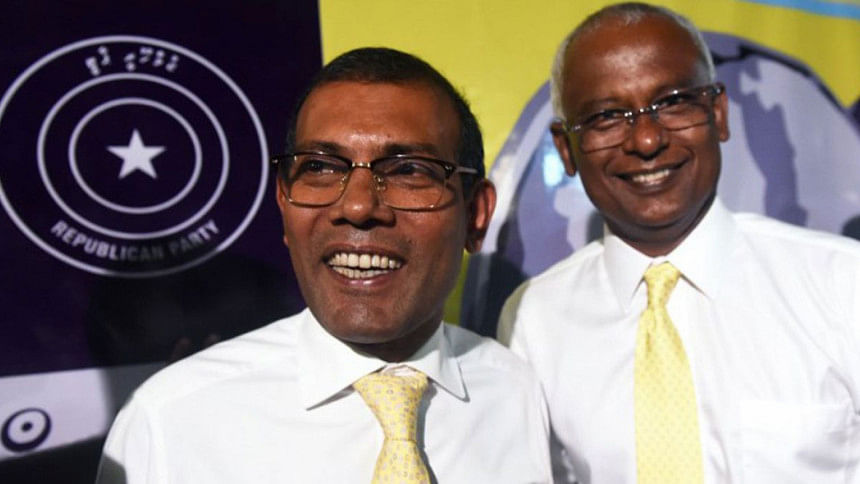Has democracy returned to the Maldives?

The last seven months have seen two watershed events in the political history of the Maldives, the strategically-located Indian Ocean archipelago that has since long been a theatre of intense rivalry between Asian giants India and China for influence. It all began with the victory of Maldivian Democratic Party leader Ibrahim Mohamed Solih in the presidential elections in September last year that brought an end to five years of authoritarian rule of Abdulla Yameen. Then the second week of April this year saw an emphatic win for the MDP in the parliamentary polls. The party's securing of two-thirds majority in the Majlis thus completed its stranglehold on the power structure of the Maldives marking a remarkable transformation in the country's politics.
The two events, which have brought democracy in the Maldives back on rail, are momentous when one looks back at the five-year rule of Yameen since 2013 as he systematically undermined the Maldives' fledgling democracy and all key institutions by putting political opponents and Supreme Court judges in prison, clamping down on civil liberties, muzzling the media and patronising Islamic radicals as is common under any authoritarian rule.
With Solih as President and MDP leader Mohamed Nasheed, the former president, tipped to be the next prime minister, the party is best placed now to introduce political and economic reforms to insulate the Maldives from possibilities of return of despotic rule in future. On his return home from exile coinciding with the parliamentary election victory, Nasheed did promise the sweeping reforms. High on his wish-list is a shift from the existing presidential form of government to parliamentary system so that there are checks and balances between the executive power and legislative oversight. The kind of majority MDP has in Majlis will no doubt help it push through the constitution amendments for this, but analysts suggest it should not be done too fast and pressed too far. On the economic front, MDP's 19-point agenda includes anti-corruption measures including asset disclosure and introduction of income tax, minimum wage and unemployment benefits in a bid to loosen the elites' sway over the economy and diversify the economy. Then there is also the issue of reforming the judiciary.
The developments in the Maldives are music to India's ears after New Delhi had lost leverage under the Yameen-rule, which had steadily witnessed a steady rise of China's clout in the island nation as the former dictator bulldozed through in parliament, sans the opposition. A free trade agreement with Beijing two years ago and China opening its purse strings to fund mega projects in that country, including a bridge between capital Male and the international airport, and house construction, has put the latter in a debt-trap like Sri Lanka. The Maldive's debt to China is estimated to be up to three billion dollars, a huge sum for a small country like the island nation with little sources of earning other than tourism, the backbone of its economy.
India lost no time in reaching out to the new political dispensation in the Maldives seeking to stage a return to the strategic picture in that country. Apart from the customary phone call congratulating Solih on his victory in presidential poll, Indian Prime Minister Narendra Modi travelled to the Maldives to attend Soli's inauguration as President in November last year in what was the former's first visit to that island nation in five years. Before that, Modi had visited all South Asian countries except the Maldives. Modi's trip set the stage for more exchange of high-level visits: Solih came to India in December last and Indian External Affairs Minister Sushma Swaraj had travelled to Male in March this year. During Solih's visit, India came out with a USD 1.4 billion financial package for the Maldives. Soon after the parliamentary poll results were out in the Maldives, Modi also made it a point to call up both Solih and Nasheed on April 8 reiterating India's "deep commitment, in keeping with its 'Neighbourhood First' policy, to work closely with the Maldives…and assist the Maldives as per the latter's requirement in its socio-economic development."
However, it would be naïve to assume or expect that the Maldives' new government will overnight change its regional orientations. There are no easy way-outs of its serious economic challenges. Any vigorous attempt by the Solih government to move away from China could see it dealing with the charge of being "pro-India", a convenient political ploy used by some parties in South Asia to counter their rivals. Sri Lanka is an example of how a change of government there has not resulted in a decrease of China's importance because of its inability to repay the large Chinese loan for the Hambantota sea port. True, China's financial muscle has seen it expanding its footprints in South Asia, including the Maldives, neutralising to some extent India's proximity to its neighbours. India will be keenly watching how the Maldives under a new political executive deals with China in the time to come.
Pallab Bhattacharya is a special correspondent for The Daily Star.

 For all latest news, follow The Daily Star's Google News channel.
For all latest news, follow The Daily Star's Google News channel. 



Comments